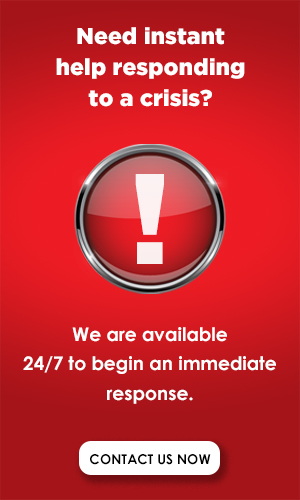 A crisis is a low probability, high impact event that has the potential to change the course of a company or organization’s future. In today’s 140 character world, organizations in crisis must immediately take control of their reputation or cede that to others. One in four organizations hit by crisis go out of business within five years. Without crisis planning and management your organization has a good chance of being one of them.
A crisis is a low probability, high impact event that has the potential to change the course of a company or organization’s future. In today’s 140 character world, organizations in crisis must immediately take control of their reputation or cede that to others. One in four organizations hit by crisis go out of business within five years. Without crisis planning and management your organization has a good chance of being one of them.
Like a medical crisis, there is a “golden hour” after a negative event that can change the outcome forever. Those who move into action within that time have a better chance of protecting their reputations, businesses, employees, and in some cases the public. Unfortunately most miss that critical time because they either don’t see the signs of impending crisis or they simply overlook them.
After three decades as crisis communications managers we know the signs, we understand the next steps and we know what to do to take back control of your reputations in the midst of crisis. In today’s 24 hour news environment, it’s critical to seize control of your reputation to:
- Receive fair and accurate treatment in the media
- Recover or rebuild your reputation
- Return to business as quickly as possible.
Crises We Have Managed:
- Adverse court decisions
- Bankruptcy
- Building collapse
- Business and plant closings
- Change of leadership
- Charges of bigotry
- Contagious disease
- COVID-19 response
- Criminal actions by c-suite executive, staff and volunteers
- Embezzlement by employees
- Media assaults on key executives
- Product failures
- Professional misconduct
- Sexual misbehavior
- Staff lay-offs and downsizing
- Union actions
- Upcoming legal actions
- Violations of the law
Pre-Crisis Planning – The Crisis Communication Plan
This service creates a blueprint for your organization’s communications response to a crisis before it hits. While many organizations have an operational crisis plan in place, research tells us that only one in four organizations have up-to-date, formal plans for communicating during a crisis. This puts their reputations at risk any time an angry consumer, a former employee or a savvy competitor sits down at a computer.
A Crisis Communications Plan gives your organization the ability to take control of your own reputation instead of leaving it to chance. The ultimate goal is to build the right foundation to help your organization not only survive, but to thrive after a crisis.
During The Crisis – Crisis Communications Management
Like a medical crisis, there is a short, but critical time after a negative event that can change the outcome forever. Individuals and organization that move into action within that narrow window have a much better chance of protecting their reputations, businesses, employees and the public while securing their future success. This is especially important in today’s on-line world where a blog post, YouTube video, tweet or other social media post can destroy a reputation in seconds. Unfortunately, most miss the boat because they are caught in a web of confusion during this critical state. By working with clients’ attorneys and other significant advisors, we prepare them to take appropriate and timely action for the best possible outcome. We help you take advantage of all communications vehicles including your organization’s earned media (public relations); owned media (website and social media) and paid media (advertising – on and off-line).
Our firm will help you deal with and weather a crisis, regardless of whether or not you have a Crisis Communications Plan in place.
Crisis Communication Goals:
- To make sure you are portrayed fairly, accurately and responsibly in both traditional and on-line media.
- To enable your organization to safeguard its reputation and, in some cases, recover it.
- To operate within the legal constraints of the situation and in concert with your attorneys, whether they are in-house or outside counsel.
- To permit your organization to get back to business as usual.
- To make optimal use of all media – both traditional and on-line – to tell your story quickly and accurately.
Crisis Services:
- Formulating strategy with legal counsel, senior management, in-house public relations and marketing executives and other stakeholders.
- Creating responses consistent with an organization’s business strategy, vision and principles. For individuals, the response will be consistent with their personal values and principles.
- Generating press and social media policy to govern the actions of employees and stakeholder conduct during the crisis.
- Producing and distributing appropriate materials that make best use of traditional and on-line media.
- Serving as liaison between members of the press, legal counsel and corporate officials 24-hours a day.
- Collaborating with legal counsel on the content and distribution of appropriate materials to the members of the media.
- Preparing in-house executives or appropriate representatives of the organization for interviews through media training (including on-camera interview simulations), creating key talking points, and performing question and answer drills.
- Creating communication vehicles for stakeholders such as customers, employees, members of the Board, volunteers and vendors.
- Crafting simplified messages for key stakeholders’ informal communications.
- Strategizing and developing appropriate messages for your organization’s Social Engagement Team.
- Monitoring the development and response to the crisis and adapting strategies as needed.
- Leading a post-crisis review of responses and outcomes
- Updating the Crisis Plan (if appropriate) based upon the post-crisis review
- Suggesting follow-up public relations, social media and advertising activities to help restore the organization’s reputation and status within the community.
 A crisis is a low probability, high impact event that has the potential to change the course of a company or organization’s future. In today’s 140 character world, organizations in crisis must immediately take control of their reputation or cede that to others. One in four organizations hit by crisis go out of business within five years. Without crisis planning and management your organization has a good chance of being one of them.
A crisis is a low probability, high impact event that has the potential to change the course of a company or organization’s future. In today’s 140 character world, organizations in crisis must immediately take control of their reputation or cede that to others. One in four organizations hit by crisis go out of business within five years. Without crisis planning and management your organization has a good chance of being one of them.
Like a medical crisis, there is a “golden hour” after a negative event that can change the outcome forever. Those who move into action within that time have a better chance of protecting their reputations, businesses, employees, and in some cases the public. Unfortunately most miss that critical time because they either don’t see the signs of impending crisis or they simply overlook them.
After three decades as crisis communications managers we know the signs, we understand the next steps and we know what to do to take back control of your reputations in the midst of crisis. In today’s 24 hour news environment, it’s critical to seize control of your reputation to:
- Receive fair and accurate treatment in the media
- Recover or rebuild your reputation
- Return to business as quickly as possible.
Crises We Have Managed:
- Adverse court decisions
- Bankruptcy
- Building collapse
- Business and plant closings
- Change of leadership
- Charges of bigotry
- Contagious disease
- Criminal actions by c-suite executive, staff and volunteers
- Embezzlement by employees
- Media assaults on key executives
- Product failures
- Professional misconduct
- Sexual misbehavior
- Staff lay-offs and downsizing
- Union actions
- Upcoming legal actions
- Violations of the law
Pre-Crisis Planning – The Crisis Communication Plan
During The Crisis – Crisis Communications Management
This service creates a blueprint for your organization’s communications response to a crisis before it hits. While many organizations have an operational crisis plan in place, research tells us that only one in four organizations have up-to-date, formal plans for communicating during a crisis. This puts their reputations at risk any time an angry consumer, a former employee or a savvy competitor sits down at a computer.
A Crisis Communications Plan gives your organization the ability to take control of your own reputation instead of leaving it to chance. The ultimate goal is to build the right foundation to help your organization not only survive, but to thrive after a crisis.
During the Crisis – Crisis Communications Management
Like a medical crisis, there is a short, but critical time after a negative event that can change the outcome forever. Individuals and organization that move into action within that narrow window have a much better chance of protecting their reputations, businesses, employees and the public while securing their future success. This is especially important in today’s on-line world where a blog post, YouTube video, tweet or other social media post can destroy a reputation in seconds. Unfortunately, most miss the boat because they are caught in a web of confusion during this critical state. By working with clients’ attorneys and other significant advisors, we prepare them to take appropriate and timely action for the best possible outcome. We help you take advantage of all communications vehicles including your organization’s earned media (public relations); owned media (website and social media) and paid media (advertising – on and off-line).
Our firm will help you deal with and weather a crisis, regardless of whether or not you have a Crisis Communications Plan in place.
In all cases, our work is built around five goals:
- To make sure you are portrayed fairly, accurately and responsibly in both traditional and on-line media.
- To enable your organization to safeguard its reputation and, in some cases, recover it.
- To operate within the legal constraints of the situation and in concert with your attorneys, whether they are in-house or outside counsel.
- To permit your organization to get back to business as usual.
- To make optimal use of all media – both traditional and on-line – to tell your story quickly and accurately.
Our services may include any or all of the following:
- Formulating strategy with legal counsel, senior management, in-house public relations and marketing executives and other stakeholders.
- Creating responses consistent with an organization’s business strategy, vision and principles. For individuals, the response will be consistent with their personal values and principles.
- Generating press and social media policy to govern the actions of employees and stakeholder conduct during the crisis.
- Producing and distributing appropriate materials that make best use of traditional and on-line media.
- Serving as liaison between members of the press, legal counsel and corporate officials 24-hours a day.
- Collaborating with legal counsel on the content and distribution of appropriate materials to the members of the media.
- Preparing in-house executives or appropriate representatives of the organization for interviews through media training (including on-camera interview simulations), creating key talking points, and performing question and answer drills.
- Creating communication vehicles for stakeholders such as customers, employees, members of the Board, volunteers and vendors.
- Crafting simplified messages for key stakeholders’ informal communications.
- Strategizing and developing appropriate messages for your organization’s Social Engagement Team.
- Monitoring the development and response to the crisis and adapting strategies as needed.
- Leading a post-crisis review of responses and outcomes
- Updating the Crisis Plan (if appropriate) based upon the post-crisis review
- Suggesting follow-up public relations, social media and advertising activities to help restore the organization’s reputation and status within the community.



